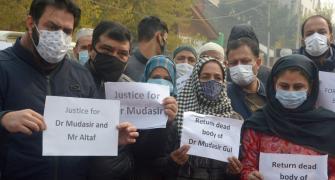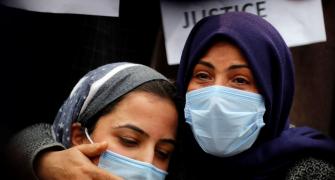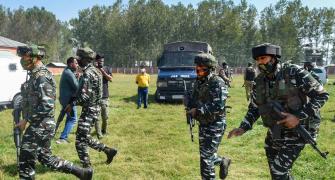Declaring that the administration's action was violative of the Right to Equality, the Jammu and Kashmir high court on Friday ordered that the body of a civilian dubbed a terrorist and killed in an encounter in November 2021 be exhumed and handed to his family for last rites.

The 13-page order by Justice Sanjeev Kumar said that if the body of deceased Amir Magrey is "highly putrefied" and its exhuming could cause a risk to public, the administration would pay Rs 5 lakh to the family as compensation for depriving the family to give him a decent burial as per the family traditions.
"The decision of the respondents (Jammu and Kashmir administration) not to allow the petitioner to take away the dead body of his son to his native village for last rites was per se arbitrary and falls foul of Article 14 (Right to Equality) of the Constitution of India," the judge said in his order.
Magrey was among the four people killed in Hyderpora in the outskirts of Srinagar on November 15, 2021. The police claimed all of them to be terrorists and buried their bodies in Kupwara in North Kashmir.
The Jammu and Kashmir police had decided in 2020 that it would not hand over the bodies of "terrorists" to family members and instead would bury them at different places to avoid a law and order situation.
However, after a public outcry about the veracity of the encounter, the Jammu and Kashmir administration buckled under pressure and exhumed the bodies of two -- Altaf Ahmad Bhat and Dr Mudasir Gul -- and handed them over to their family members.
Amid a growing attack on the claims of the police about the encounter, in which the army had stepped into the city after decades, the Jammu and Kashmir government had formed a special investigating team to probe the matter.
Amir's father, Mohammed Latief Magery, through his advocate Deepika Singh Rajawat, had contested the claims of the police and said he was "totally unconvinced with the respondents' (police/administration) claim that he was a militant and killed in an encounter and, therefore, approached the authorities for intervention."
The order said it is the grievance of Magrey that "the respondents have very conveniently put the tag of terrorist on his son and have denied even a decent burial to the dead body".
He informed the court that he approached all authorities for handing over Amir's body but nobody listened to him and that the body of his son was, without his presence, buried at Wadder Payeen graveyard in Kupwara.
The judge questioned the stand of the police and the administration saying that from their reply given in the court and also from the documents submitted in a sealed cover, "It is not coming forth as to why the request of the petitioner for return of body of his son Amir Latief Magrey was not conceded and his body exhumed along with Mohammed Altaf Bhat and Dr Mudasir Gul."
"Without dilating much on the issue, it can be said to be well settled that the Right to Life and Liberty guaranteed to a citizen by Article 21 of the Constitution of India includes right of the citizen to live with human dignity and this right to live with human dignity even extends after death though in a limited extent," the order said.
The question in the context of the present controversy is whether the State can deny this right in the name of preventing the law and order situation going out of hand, the judge asked.
The order said though the government contended that the decision not to hand over the body of the deceased to the petitioner for performing his last rites was taken in the larger public interest and to prevent the law and order situation going out of hand, it is, however, unclear, "Why the dead bodies of two of the four killed in the encounter....were exhumed and handed over to their relatives for their last rites in the graveyards of their choice and why the similar right claimed by the petitioner was denied."
The judge cited the report of the SIT, in which Amir was described as a "confirmed terrorist whereas the other two killed -- Altaf Ahmad Bhat and Dr Mudasir Gul -- were only "associates of the terrorists."
"I do not find any logic or sense in distinction so made by the respondents. It transpires that due to public pressure and demand by the relatives of the two deceased...the respondents relented and permitted their dead bodies to be exhumed and handed over to their relatives.
"Since the petitioner was a resident of Gool, a remote village in Jammu province and did not have much say in the Valley and, therefore, his request was arbitrarily turned down," the judge said.









